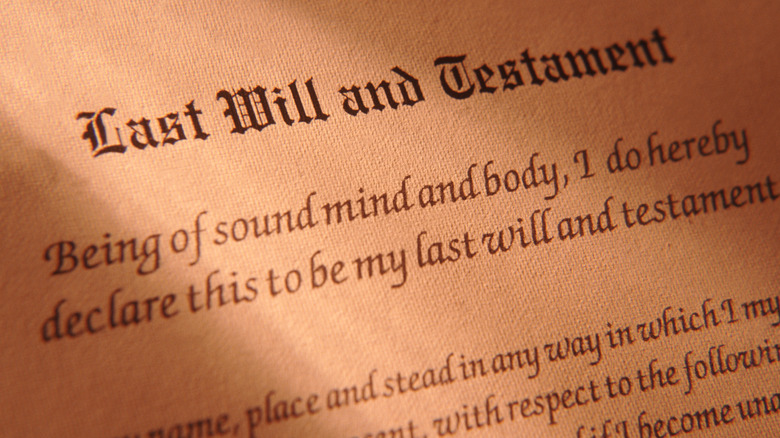The Type Of Trust That Can Help You (Legally) Avoid Paying Taxes
Paying less in taxes sounds great. Everyone's ears light up when the thought of a legal (see: Tax evasion versus tax avoidance) and clever way to reduce their tax burden comes into casual conversation. From the use of itemized deductions in years when that adds value over the standard method (perhaps a year with lots of medical expenditures), to write-offs for donations and contributions to your IRA, it's common to actively seek out ways to lower your tax burden. In many cases, this will ideally result in an even greater tax refund, not just a reduction in any tax money you might owe the IRS.
In some instances, the use of a trust can help mitigate tax liabilities, however, there's a specific type of trust that you'll need to consider to utilize the format's tax advantages. Moreover, this kind of trust doesn't eviscerate tax burdens altogether, but rather protects you and your heirs against specific tax liabilities that may ultimately be significant without the assistance of this trust structure. The legal tool in question is called an irrevocable trust, and it's function mirrors what the name implies. An irrevocable trust can be (relatively) easily established, but it cannot be easily changed, dismantled, or otherwise altered. This makes the tool rigid and inflexible, limiting what you might be able to do with assets later on. However, it's a fabulous way to shield your financial portfolio from certain vulnerabilities.
An irrevocable trust defends heirs from inheritance taxes
An irrevocable trust is a legal entity that can take ownership of your assets. Anything you might own can be transferred into the trust. Once established, you aren't able to retool the "rules" of the legal entity without a court order, though. This means that you might want to put cash or investment assets into the trust to protect them today, and you may have difficulty utilizing them in a way that benefits you tomorrow. However, placing real estate assets in a trust and then naming yourself and your loved ones as beneficiaries effectively protects the assets from estate taxes and other financial liabilities.
Estates worth more than $13.61 million (in 2024) or $27.22 million for married couples are subjected to estate taxes. This is a sort of inheritance tax paid by the estate before its assets can be transferred to named beneficiaries. It's important to keep in mind that only the portion of an estate that rises above these thresholds is taxed, but the top tax rate stands at 40%, potentially shaving off quite a bit of capital from particularly valuable estates. Placing assets like real estate and investment portfolios in an irrevocable trust removes them from an estate's ownership, reducing the amount of capital totaled up in an estate's holdings, even though the property can still be used by the beneficiaries. These assets aren't tax-free, however. The trust will be taxed based on a variety of factors. If the trust owns your family business, for example, the trust will technically be responsible for the tax burden, but you'll functionally manage its assets and liabilities from within the vessel.
This type of trust can also protect your assets in the event of a bankruptcy
Another important consideration surrounding irrevocable trusts is the protection it offers through bankruptcy proceedings. If you place your home under the ownership of an irrevocable trust, you do not own the property. However, unless you have other plans for the home, your trust documents will certainly stipulate that you can continue to live in the home, even after you relinquish technical ownership. This gives you the ability to use the home as normal, but protect it from lenders if you file for bankruptcy. The same feature applies to other assets you might place inside the trust. Any kind of possession you might want to protect can be reassigned to the trust's ownership to protect it. However, it's not a simple or entirely fool-proof method for someone intending on "hiding assets" before declaring bankruptcy.
For one thing, bankruptcy courts aren't friendly to people who are obviously seeking to shirk responsibility while protecting as much of their stuff as possible, leveraging as many loopholes as they can find. Similarly, any asset you place in an irrevocable trust may be difficult to utilize later, even if you are able to keep it. Selling stock holdings, for instance, will result in cash assets that remain within the trust rather than crossing the barrier into your personal account. Finally, if you make yourself the trustee, you won't benefit from alleviated tax liabilities on income generated by assets in the trust. More importantly, a creditor may be able to ultimately pry assets from the trust's ownership to pay your debts since you're functionally still in control of the property.


